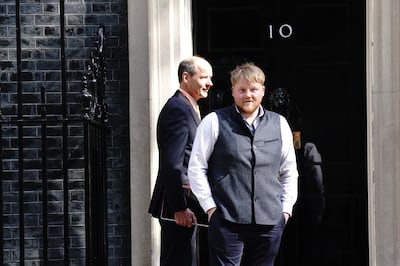Farmers, supermarket bosses, food manufacturers and consumer group representatives gathered at 10 Downing Street on Tuesday to discuss Britain's food security.
Food price inflation, how much farmers are paid for their produce, the availability of seasonal workers and the profit margins of supermarkets and food manufacturers all came under scrutiny at the government's Farm to Fork Summit.
The government said the meeting would “boost growth, drive innovation and improve sustainability”.
According to a Downing Street official, Prime Minister Rishi Sunak told his Cabinet that supporting farmers is not about “some nostalgic vision of the UK's rural past”.
“He said it's about growing the economy, creating more jobs and building the UK's food security,” the official said.

Backing British farmers
Before the meeting, the government announced measures to support farmers, including a £30 million package for investment in new technologies, a review of supply chains to make sure they obtain a fair price for their produce and initiatives to make it easier for them to build and run farm shops on their land.
“I will always back British farmers, and I pay tribute to their hard work and dedication all year round which keeps shelves stocked and food on our tables,” said Mr Sunak.
“Supporting our farmers and food producers must, and always will be, at the heart of our plans to grow the economy and build a more prosperous country.
“That’s why I’m proud to host this summit, and working together, I’m determined to build resilience, strengthen our food security and champion the best of British at home and overseas.”
To alleviate the labour shortage at crucial times of the year, the government announced that 45,000 visas will be available again to the horticulture sector next year, “enabling them to plan ahead for the picking season”.
Food price inflation
As well as the plight of farmers, the summit aimed to tackle food price inflation in the UK, which rose to more than 19 per cent in March.
“Alongside farming issues, we believe the summit must address costly and heavy-handed regulation, post-Brexit labelling requirements, skills shortages and the complexity of border checks, all of which are pushing up costs when food price inflation is at a record high,” said Karen Betts, chief executive of the Food and Drink Federation.
Supermarket chain Tesco announced on Tuesday that it would lower the prices of foodstuffs including its own-brand pasta and cooking oil.
It follows a recent round of price cuts by the major supermarkets, including Tesco, on certain lines of bread and butter.
Tesco is dropping prices of what a representative called 30 “key cupboard essentials”.

Analysis by the Consumer Association's Which? magazine shows that some meat, yoghurt and vegetable products are now twice the price they were in supermarkets a year ago.
“It's very alarming to see products such as meat, cheese and vegetables that people rely on still rapidly soaring in price,” said Sue Davies, head of food policy.
“As the Prime Minister gathers supermarket bosses today to discuss the problem of inflation, we urge him to ask supermarkets to commit to do much more, including stocking budget lines in convenience stores to ensure easy access to basic, affordable food ranges that support a healthy diet, particularly in areas where people are most in need.
“Supermarkets must also provide transparent pricing so people can easily work out which products offer the best value.”
The summit comes a day after the UK's Competition and Markets Authority said it was examining the grocery retail market in an effort to ascertain if competitive mechanisms were working correctly.
Since the end of last year, many supermarkets have been sporadically left with empty egg shelves due to a variety of reasons, including rising chicken feed costs and an outbreak of bird flu.
Overall, inflation in the UK has led to the sharpest jump in food prices since 1977. The issue is now more of a concern for the Bank of England than rises in energy costs.


